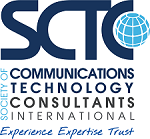Last week I attended the Society of Communication Technology Consultants (SCTC) annual conference and moderated a panel discussion about unified communications (UC). Some interesting insights about the current and future states of the UC market emerged.
First, we discussed changes in the UC space in the past 12 months, after the initial shift to remote work. Panelist Paul Ginn, Group Director of Product Marketing at Mitel, says it sees growth in mid- to enterprise markets in 2022. Customers in those segments desire more deployment flexibility, software release control, and privacy compliance, leading them to select a private cloud solution. However, growth is also strong in the public cloud. Rob Shelby, Senior Regional Vice President of Partner Sales at RingCentral said, “RingCentral’s industry-leading UCaaS platform has continued its consistent growth year over year reaching over $2 billion in ARR with over 5 million paid UCaaS seats deployed around the globe.”
Going forward, Erik Romanek, Director of Strategic Initiatives at Vertical Communications, said buyers making communication technology purchases should be looking beyond features. Support models vary greatly among providers and can have a big impact on the success of the chosen technology. There appears to be a growing ecosystem of value added resellers arising around the cloud solutions to fill out these needs. Chris Burgy, Vice President of Corporate Development at Ooma, Inc. anticipates an acceleration in the consolidation of UCaaS providers . As the economy becomes more challenging, Burgy, predicts that smaller companies and regional providers will face unique headwinds around access to resources and the ability to scale their businesses.
The panel moved on to talk about Microsoft Teams Voice. With Microsoft’s massive presence on the desktops of most organizations, they have a large presence. Of course, as competitors, they all acknowledged that Teams Voice is a big player. Rob Shelby questioned Microsoft’s commitment to voice, citing a history of entering and exiting the space.
Mitel has found that customers cannot serve their entire workforce with Microsoft Teams, and particularly the information and service worker roles. This has resulted in isolation or users resorting to personal mobile devices. Also, many customers are unhappy with the reliability and overall cost of adding Teams Voice and are turning to lite integrations such as Mitel Telephony only client solutions to gain the ubiquity, reliability and cost point they need, according to Ginn.
Burgy noted that the pandemic accelerated the shift to remote work and Microsoft became a beneficiary of that for knowledge workers. But, Burgy said, “Teams isn't the best solution for telephony-centric organizations who need to conduct business that way.” And the “administration and deployment of Teams Voice is highly complex. Microsoft has a long way to go to simplify that.”
Next, we talked about the growing trend for combined unified communications and contact center platforms. It requires a significant amount of development resources to keep two product lines updated and vibrant. Typically, the combined UC and contact center products have less robust contact center offerings that don’t include a full suite of contact center add-ons such as workforce management (WFM)/ workforce engagement management (WEM), speech analytics, quality assurance and coaching, scripting, workflows, etc. I asked the group if we can expect high end contact center capabilities as part of a combined UC and contact center offering. Shelby said, “RingCentral will continue to provide the only platform in the industry that combines the leader in UCaaS and CCaaS into a single solution for the clients.” Romanek added, “There will always be people who need the high-end contact center capabilities, but most organizations have simpler needs and can be well served by the combined platform capabilities and their simplicity of management.”
We discussed whether UCaaS solutions have reached feature parity with traditional on-premises products. Romanek said that, as a VAR, vertical communications works with multiple different solutions in the marketplace. “There are features that are not available on cloud solutions, but that is largely by design. Cloud solutions have a different level of flexibility than premise-based solutions that allow them to deliver similar services without some of the specific capabilities.” Burgy added that there may be some niche situations where a legacy feature has value, but cloud solutions meet the needs of almost all organizations. “There’s no need for a lot of those premise-based features,” according to Shelby.
But what about parity in reliability, support, implementation, and training?
Shelby stated that “RingCentral’s platform has not had an outage in the four plus years I have been with RingCentral.” Romanek indicated that there are differences in the level of support provided during the implementation process, and that’s where a VAR like Vertical Communications can step in and help customers with additional support during the process. “For example, number porting is a time suck,” and having assistance in the process is helpful.
Ginn mentioned that via “Mitel’s extensive network of channel partners worldwide, customers can rely on installation and deployment services for onsite and private cloud deployments rather than self-deploy and administer.”
Looking to the future, it’s clear that customer engagement now includes multiple digital channels. The group talked about what to expect from UC solutions to address these needs. Shelby said that RingCentral has expanded beyond voice into video, team messaging, and meeting capabilities, with additional digital channels to come.
Melissa is writing on behalf of the SCTC, a premier professional organization for independent consultants. SCTC consultant members are leaders in the industry, able to provide best of breed professional services in a wide array of technologies. Every consultant member commits annually to a strict Code of Ethics, ensuring they work for the client benefit only and do not receive financial compensation from vendors and service providers.











